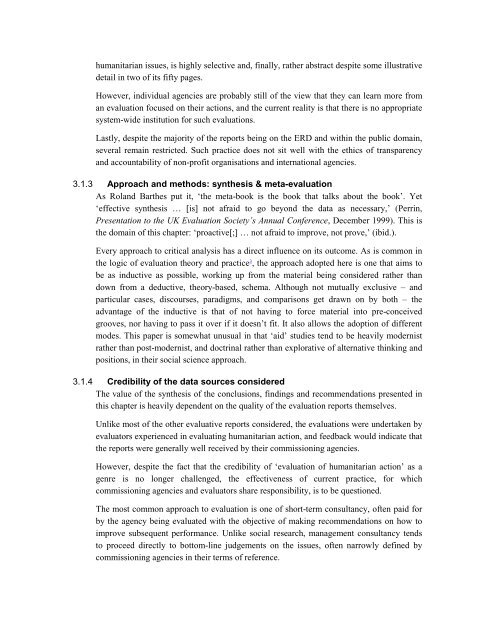Download PDF - ReliefWeb
Download PDF - ReliefWeb
Download PDF - ReliefWeb
You also want an ePaper? Increase the reach of your titles
YUMPU automatically turns print PDFs into web optimized ePapers that Google loves.
humanitarian issues, is highly selective and, finally, rather abstract despite some illustrative<br />
detail in two of its fifty pages.<br />
However, individual agencies are probably still of the view that they can learn more from<br />
an evaluation focused on their actions, and the current reality is that there is no appropriate<br />
system-wide institution for such evaluations.<br />
Lastly, despite the majority of the reports being on the ERD and within the public domain,<br />
several remain restricted. Such practice does not sit well with the ethics of transparency<br />
and accountability of non-profit organisations and international agencies.<br />
3.1.3 Approach and methods: synthesis & meta-evaluation<br />
As Roland Barthes put it, ‘the meta-book is the book that talks about the book’. Yet<br />
‘effective synthesis … [is] not afraid to go beyond the data as necessary,’ (Perrin,<br />
Presentation to the UK Evaluation Society’s Annual Conference, December 1999). This is<br />
the domain of this chapter: ‘proactive[;] … not afraid to improve, not prove,’ (ibid.).<br />
Every approach to critical analysis has a direct influence on its outcome. As is common in<br />
the logic of evaluation theory and practice 3 , the approach adopted here is one that aims to<br />
be as inductive as possible, working up from the material being considered rather than<br />
down from a deductive, theory-based, schema. Although not mutually exclusive – and<br />
particular cases, discourses, paradigms, and comparisons get drawn on by both – the<br />
advantage of the inductive is that of not having to force material into pre-conceived<br />
grooves, nor having to pass it over if it doesn’t fit. It also allows the adoption of different<br />
modes. This paper is somewhat unusual in that ‘aid’ studies tend to be heavily modernist<br />
rather than post-modernist, and doctrinal rather than explorative of alternative thinking and<br />
positions, in their social science approach.<br />
3.1.4 Credibility of the data sources considered<br />
The value of the synthesis of the conclusions, findings and recommendations presented in<br />
this chapter is heavily dependent on the quality of the evaluation reports themselves.<br />
Unlike most of the other evaluative reports considered, the evaluations were undertaken by<br />
evaluators experienced in evaluating humanitarian action, and feedback would indicate that<br />
the reports were generally well received by their commissioning agencies.<br />
However, despite the fact that the credibility of ‘evaluation of humanitarian action’ as a<br />
genre is no longer challenged, the effectiveness of current practice, for which<br />
commissioning agencies and evaluators share responsibility, is to be questioned.<br />
The most common approach to evaluation is one of short-term consultancy, often paid for<br />
by the agency being evaluated with the objective of making recommendations on how to<br />
improve subsequent performance. Unlike social research, management consultancy tends<br />
to proceed directly to bottom-line judgements on the issues, often narrowly defined by<br />
commissioning agencies in their terms of reference.
















![CynefinFramework final [Read-Only]](https://img.yumpu.com/19017304/1/190x135/cynefinframework-final-read-only.jpg?quality=85)